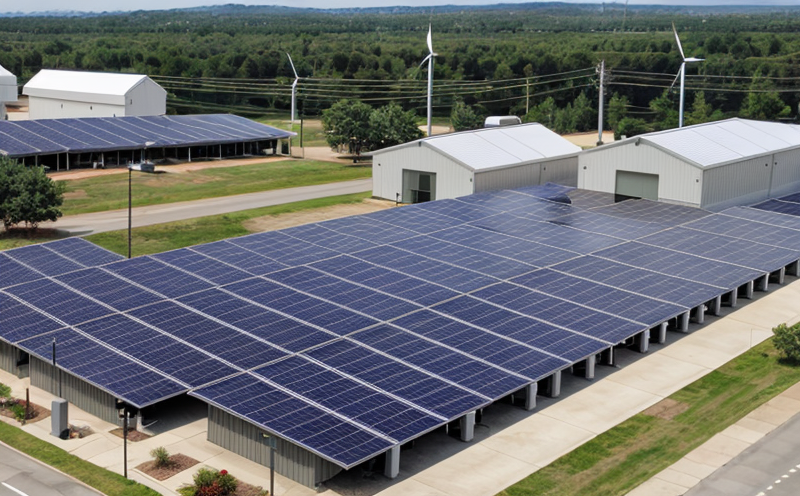UL 2202 EV Charging System Testing for Microgrids
The rapid deployment of electric vehicles (EVs) is reshaping the global transportation landscape. Simultaneously, microgrid technology is transforming energy distribution by enabling localized and resilient power systems. The combination of these two technologies presents a unique opportunity to enhance sustainability while ensuring reliable power supply during grid disruptions. To ensure safety and performance in this dynamic environment, the UL 2202 standard has been developed specifically for EV charging systems used within microgrids.
The UL 2202 standard is designed to provide stringent testing criteria that cover the various aspects of an EV charging system's design, installation, operation, and maintenance. This includes ensuring robust performance under both normal operating conditions and extreme scenarios such as grid outages or overloading situations. Compliance with this standard ensures that EV chargers are safe for use within microgrids, which is critical given the distributed nature of these systems.
The importance of UL 2202 testing cannot be overstated, especially in the context of microgrid technology where reliability and safety are paramount. By adhering to this standard, manufacturers can demonstrate their commitment to quality and regulatory compliance, thereby building trust with consumers and stakeholders alike. Additionally, successful completion of these tests opens doors for potential business opportunities both domestically and internationally.
For those involved in the development or procurement processes related to EV charging systems within microgrids, understanding the nuances of UL 2202 testing is essential. Whether you're a quality manager overseeing production facilities or an R&D engineer focusing on innovation, familiarity with this standard will help streamline your operations and ensure adherence to industry best practices.
Compliance with UL 2202 also has broader implications beyond just the safety of individual components; it contributes significantly towards fostering confidence in emerging technologies like microgrids. As governments around the world increasingly emphasize sustainability goals, standards such as this play a crucial role in establishing trust among consumers and investors.
In summary, the UL 2202 standard serves as a vital tool for ensuring that EV charging systems used within microgrids meet stringent safety requirements. By adhering to these guidelines during design, manufacturing, installation, and ongoing maintenance phases, stakeholders can help create safer, more reliable, and sustainable energy solutions.
Applied Standards
The UL 2202 standard is primarily based on the principles outlined in IEEE standards for electric vehicle charging systems. These guidelines emphasize several key areas including electrical safety, interoperability between different types of EVs and chargers, and environmental considerations such as emissions reduction targets.
- IEEE P1604 - Recommended Practice for Safety of Charging Systems for Plug-In Electric Vehicles
- IEC 62196-3:2015 - Vehicle-to-grid (V2G) communication protocols and messages
By incorporating these internationally recognized standards into its framework, UL 2202 aims to provide comprehensive protection against potential hazards while promoting efficient energy utilization.
Scope and Methodology
| Test Parameters | Description |
|---|---|
| Electrical Safety | Evaluates the effectiveness of grounding, bonding, and protective devices to prevent electric shock. |
| Power Quality | Assesses voltage levels and stability under varying conditions to ensure consistent performance. |
| Interoperability | Verifies compatibility with various types of EVs and charging solutions to promote seamless operation within microgrids. |
| Environmental Impact | Examines the ecological footprint associated with manufacturing, installation, and usage phases. |
The testing process begins with a thorough inspection of all components involved in the charging system. Following this, simulations are conducted to replicate real-world scenarios such as varying loads or unexpected power fluctuations. Throughout these tests, continuous monitoring ensures immediate detection of any anomalies which could compromise safety.
Once initial evaluations have been completed successfully, further refinements may be necessary before final certification can be issued. This iterative approach guarantees that every aspect of the charging system meets stringent quality standards set forth by UL 2202.
Competitive Advantage and Market Impact
- Innovation Leadership: Compliance with UL 2202 positions companies at the forefront of technological advancements in microgrid technology. This leadership can translate into competitive advantages by attracting early adopters looking to invest in cutting-edge solutions.
- Broad Market Reach: Meeting these stringent requirements broadens access to markets across regions that prioritize sustainability and grid resilience, including North America and parts of Europe.
The market impact of adhering to UL 2202 extends beyond just individual organizations; it contributes positively towards overall industry development. As more entities comply with this standard, the entire sector benefits from enhanced safety practices and improved product reliability.





